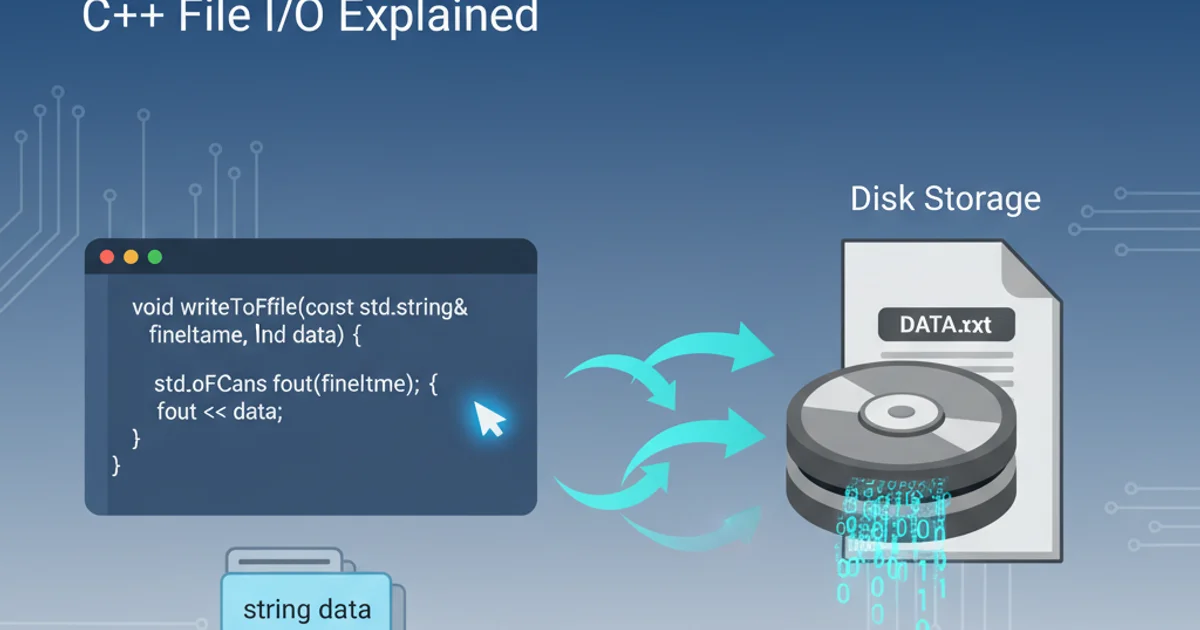How can I get fout to work in a function that is not main?
Categories:
Mastering File Output (fout) in C++ Functions Beyond main()

Learn how to effectively use std::ofstream for file output within any C++ function, ensuring proper file handling and error management.
When working with C++ applications, writing data to files is a common requirement. While it's straightforward to set up file output streams (std::ofstream) directly in your main() function, integrating this functionality into other, more specialized functions can sometimes present challenges. This article will guide you through the best practices for handling std::ofstream objects in non-main() functions, focusing on proper initialization, error checking, and resource management.
Understanding std::ofstream and Its Lifecycle
The std::ofstream class is part of the C++ Standard Library's <fstream> header and is used for writing data to files. Like any resource, a file stream needs to be opened, used, and then properly closed. Failure to close a file stream can lead to data loss, corruption, or resource leaks. The destructor of std::ofstream automatically closes the file when the object goes out of scope, which is a crucial aspect of its lifecycle.
flowchart TD
A[Function Call] --> B{Create ofstream Object};
B --> C{Open File (e.g., "output.txt")};
C -- Success --> D{Check if Open() Failed?};
D -- No --> E[Write Data to File];
E --> F[Function Returns];
F --> G[ofstream Destructor Called];
G --> H[File Automatically Closed];
D -- Yes --> I[Handle Error];
I --> F;
C -- Failure --> I;Lifecycle of an std::ofstream object within a function.
Passing std::ofstream Objects to Functions
There are several ways to pass an std::ofstream object to a function, each with its own implications for ownership and control. The most common and recommended approach is to pass it by reference, allowing the function to write to an already opened stream. Alternatively, you can create and manage the stream entirely within the function, or even return a stream from a factory function.
#include <iostream>
#include <fstream>
#include <string>
// Option 1: Pass by reference (recommended for existing streams)
void writeToStream(std::ofstream& outFile, const std::string& data) {
if (outFile.is_open()) {
outFile << data << std::endl;
} else {
std::cerr << "Error: Output file stream is not open." << std::endl;
}
}
// Option 2: Create and manage stream within the function
void writeToFileInFunction(const std::string& filename, const std::string& data) {
std::ofstream outFile(filename, std::ios::app); // Open in append mode
if (outFile.is_open()) {
outFile << data << std::endl;
// outFile will be automatically closed when it goes out of scope
} else {
std::cerr << "Error: Could not open file '" << filename << "' for writing." << std::endl;
}
}
int main() {
// Example for Option 1
std::ofstream mainOutFile("output_main.txt");
if (mainOutFile.is_open()) {
writeToStream(mainOutFile, "Data from main function.");
writeToStream(mainOutFile, "More data via function call.");
mainOutFile.close(); // Explicitly close, though destructor would too
} else {
std::cerr << "Error: Could not open output_main.txt" << std::endl;
}
// Example for Option 2
writeToFileInFunction("output_function.txt", "Data written directly by function.");
writeToFileInFunction("output_function.txt", "Appending more data.");
return 0;
}
Demonstrates passing std::ofstream by reference and managing it locally within a function.
std::ofstream by reference, ensure the stream is already open and valid before passing it to the function. The function should then perform its own is_open() check before attempting to write.Error Handling and Best Practices
Robust file I/O requires careful error handling. Always check if the file stream successfully opened using is_open() or by checking the stream's state flags. Additionally, consider using std::ios::app to append to existing files or std::ios::trunc to clear them. For more complex scenarios, RAII (Resource Acquisition Is Initialization) principles are naturally handled by std::ofstream's destructor, but explicit checks are still vital.
#include <iostream>
#include <fstream>
#include <string>
#include <stdexcept>
// Function to safely open and return an ofstream (RAII-friendly)
std::ofstream openOutputFile(const std::string& filename) {
std::ofstream outFile(filename, std::ios::out | std::ios::app); // Open for output, append mode
if (!outFile.is_open()) {
throw std::runtime_error("Failed to open file: " + filename);
}
return outFile;
}
// Function that uses the safely opened stream
void logMessage(std::ofstream& logStream, const std::string& message) {
if (logStream.is_open()) {
logStream << "LOG: " << message << std::endl;
} else {
// This case should ideally not happen if openOutputFile is used correctly
std::cerr << "Warning: Log stream not open, message not logged: " << message << std::endl;
}
}
int main() {
try {
std::ofstream myLogFile = openOutputFile("application.log");
logMessage(myLogFile, "Application started successfully.");
logMessage(myLogFile, "Processing user input...");
// myLogFile will be automatically closed when main() exits
} catch (const std::runtime_error& e) {
std::cerr << "Fatal error: " << e.what() << std::endl;
return 1;
}
return 0;
}
Example demonstrating robust file opening with error handling and RAII.
std::ofstream objects by value from functions if possible, as this can lead to slicing or unexpected behavior due to copy semantics. If you need to return a stream, consider returning a std::unique_ptr<std::ofstream> or passing an existing stream by reference.